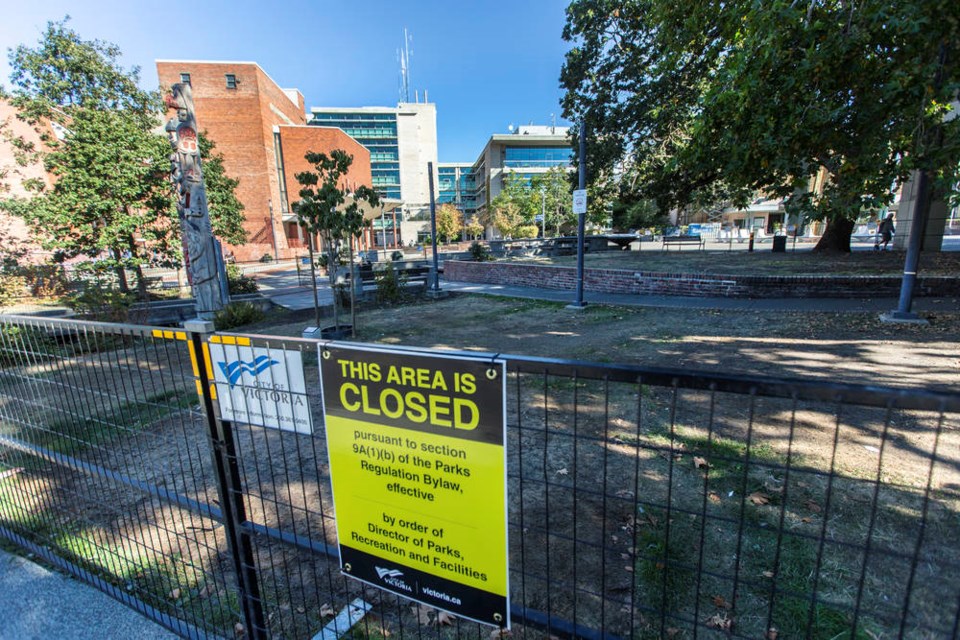Victoria city council will continue to allow people without homes to pitch tents in Centennial Square despite shutting down a previous encampment there this week due to criminal activity.
Coun. Geoff Young has been a vocal opponent of allowing all-day camping in city parks during the COVID-19 pandemic, but he argued that Centennial Square should be left in the mix of available sites for campers.
“I don’t want to do anything to harm our downtown business community any more than they’re already being harmed,” he said. “But, at the same time, simply, there are some benefits to Centennial Square. There is a lot of hard surface and it is extremely well-policed as we know by our corps of commissionaires.”
Young said the new size and spacing requirements for tents that council approved Thursday will limit the number of people who can camp in the square once it re-opens.
The plaza remains closed for an indefinite period of remediation after the last campers vacated the site on Tuesday. City officials ordered the square closed last week, saying it had “become entrenched with a criminal element.”
“I think that having the tents there will serve as a reminder and perhaps expose the councillors to what people who live around the parks are being exposed to,” Young said.
Mayor Lisa Helps along with councillors Charlayne Thornton-Joe and Jeremy Loveday voted against allowing camping in the square.
“We have heard overwhelmingly and very clearly from our businesses that they are already struggling,” Helps said in an interview. “They’ve got space reductions … and having people camping in the central business district doesn’t help things.”
The debate took place as council approved a suite of measures to manage the growing numbers of people without homes sheltering in public parks across the city during the COVID-19 pandemic.
The city will continue to allow all-day camping in certain parks, but there will be new restrictions on the size, spacing and location of shelters as well as a ban on open-flame appliances and combustibles due to a rash of explosions.
In addition, council agreed to boost the number of bylaw officers and spend $40,000 to engage people without homes for their thoughts on better managing the encampments.
The number of temporary shelters has more than doubled from June to August and now sits at about 275, a city report shows. That’s in addition to the more than 500 people who have been moved into former hotels and other sites purchased or leased by B.C. Housing since the pandemic began.
Helps stressed that the measures approved by council on Thursday are temporary. “The bylaw changes that were approved today – including the continuation of daytime sheltering – will end 30 days after the provincial state of emergency ends,” she said.
Loveday pushed back against those who have criticized the city for welcoming supportive housing and providing services to people. He said it’s probably true that Victoria is attracting people from within the region who need those services.
“If you live in Oak Bay and there’s no services for you, then you’re going to go closer to where those services are,” he said. “To me, that’s not a reason at all to stop providing services in the city of Victoria. It means that other municipalities need to step up and start saying, ‘Yes’, and start doing their part.
“This is a regional crisis. It’s a provincial crisis, a federal crisis, and having that burden be borne within our region by one municipality, isn’t right and it’s not appropriate and we’re not able to do it. We need help.”
Loveday said continued downloading over decades has created the current crisis. “If you look at the issues we’re having on our streets, it’s homelessness, housing, health care – none of those are municipal jurisdictions.”
The specific bylaw changes, which will be adopted at a later date, will limit tents to three metres square in size and require them to be at least four metres from other structures to prevent the spread of fire and COVID-19.
As well, shelters will be banned within 50 metres of a school, a new restriction that stems largely from concerns about encampments in Beacon Hill Park across the from South Park School in James Bay.
Thomas Soulliere, director of parks, said the ban on open-flame appliances is necessary to reduce the risk of fire and injuries. There have been half a dozen small explosions related to propane containers or other tanks at temporary shelters in the parks, he said.
“Fortunately we haven’t had any serious injuries, but the risk has been identified as one that is significant.”
Council agreed to spend an additional $165,000 in 2020 to hire five bylaw officers as the number of cases per officer has increased by 80 per cent since last year. The annual cost of adding the officers will be $491,000.
A proposal by Helps to increase police patrols was postponed until council can get more information about the police department’s budget situation.
